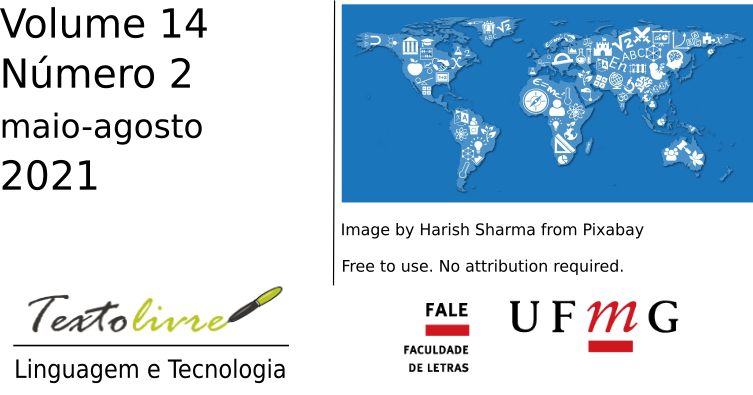SEM model for technological, ecological and inclusive teacher training in times of pandemic
DOI:
https://doi.org/10.35699/1983-3652.2021.33640Palabras clave:
Teacher training, Technology, Inclusive education, Ecology, Covid-19Resumen
This study proposes the analysis of the relationship among teacher training (TT), teacher training in inclusive education (TTIE), teacher training in technologies (TTT), teacher training in ecology (TTE) and teacher training in times of pandemic (TTP), through a confirmatory factor analysis (CFA) with the structural equation model (SEM) of a Likert scale created ad hoc validated and confirmed. Aiming to find answers, a non-experimental, descriptive, explanatory and correlational research process was carried out. A scale was the instrument used to generate data, which has been validated in content and with an excellent Cronbach’s alpha (.902). The construct validity was carried out with an exploratory factorial analysis (EFA). The participants were 598 students of Master’s Degree in Teacher Training and the last year (4th) of the Primary Education Degree from the University of Jaen (Spain). It can be concluded that there is a relationship between the different forms of teacher training. From the correlational analysis, the highest coefficient is between teacher training in ecology and teacher training in inclusive education. From the CFA it is confirmed that this correlation is a very strong one, so that inclusion and ecology should be central axes in all teacher training; on the other hand, there seems to be a low relationship between teacher training and teacher training in times of pandemic, which shows that, at least in theory, covid-19 should not affect teacher training.
Descargas
Citas
ARAVENA DOMICH, Marcela Angelina. Preguntar-se en el oficio de educar: la importancia de la pregunta en formación docente. Revista Educación, v. 45, n. 1, p. 619–631, Dec. 2020. DOI:
15517/revedu.v45i1.41144. Available from: https://revistas.ucr.ac.cr/index.php/educacion/article/view/41144.
ARIAS, F. G. El proyecto de investigación. Introducción a la metodología científica. Caracas: Episteme, 2012.
ARNAIZ, P. La educación inclusiva en el siglo XXI. Avances y desafíos. Murcia: UM, 2019.
BERMÚDEZ, G.; DE LONGHI, A. La educación ambiental y la ecología como ciencia. Una discusión necesaria para la enseñanza. Revista Electrónica de Enseñanza de las Ciencias, v. 7, n. 2, p. 275–297, 2008.
BLASCO, J. E.; LÓPEZ, A.; MENGUAL, S. Validación mediante método Delphi de un cuestionario para conocer las experiencias e interés hacia las actividades acuáticas con especial atención al windsurf. Ágora para la Educación Física y el Deporte, v. 12, n. 1, p. 75–96, 2010.
BOOTH, T.; AINSCOW, M. Index for inclusion. Bristol: CSEI, 2000.
DÍAZ QUERO, V. Formación docente, práctica pedagógica y saber pedagógico. Laurus, v. 12, p. 88–103, 2006.
DUSSEL, I. La formación docente y los desafíos de la pandemia. Revista EFI-DGES, v. 6, n. 10, p. 1–15, 2020.
ESTEVE, J. M. La formación de profesores: bases teóricas para el desarrollo de programas de formación inicial. Revista de educación, v. 350, p. 15–30, 2009.
HERNÁNDEZ SAMPIERI, R.; FERNÁNDEZ, C.; BAPTISTA, P. Metodología de la investigación. México: McGraw-Hill, 2010.
INFANTE, M. Desafíos a la formación docente: inclusión educativa. Estudios Pedagógicos XXXVI, v. 1, p. 287–297, 2011.
KAISER, H. F. An index of factorial simplicity. Psychometrika, v. 39, p. 31–36, 1974.
KAPLAN, D. Structural equation modeling: Foundations and extensions. Thousand Oaks, CA: Sage Publications, 2000.
KERLINGER, F. N. La investigación del comportamiento. México and Caracas: Interamericana and Episteme, 1979.
KLINE, R. Principles and practices of structural equation modeling. New York: Guilford Press, 2005.
LANDIS, J. R.; KOCH, G. G. The measurement of observer agreement for categorical data. Biometrics 33, p. 159–174, 1977.
LEVY, J.; VARELA, J.; ABAD, J. Modelización con estructuras de covarianzas en Ciencias Sociales. Madrid: Netbiblo, 2006.
MORENO, R.; TEJADA, A.; DÍAZ, M. COVID-19. Educación Inclusiva y Personas con Discapacidad:
Fortalezas y Debilidades de la Teleeducación. [S.l.]: Colección iAccessibility, 2020. v. 23.
NIEVA, J. A.; MARTÍNEZ, O. Una nueva mirada sobre la formación docente. Universidad y Sociedad, v. 8, n. 4, p. 14–26, 2016. Available from: http://rus.ucf.edu.cu/.
PÉREZ SERRANO, G. Investigación cualitativa. Retos e interrogantes. Madrid: La Muralla, 2004.
RODRÍGUEZ JIMÉNEZ, Andrés; MIQUELI RODRÍGUEZ, Bertha; DÁVILA VALDÉS, Yosdey. Identificación de necesidades de formación continua del profesorado ante las demandas educativas del siglo XXI. Actualidades Investigativas en Educación, v. 21, n. 1, p. 1–32, Jan. 2021. DOI: 10.15517/aie.v21i1.44073. Available from: https://revistas.ucr.ac.cr/index.php/aie/article/view/44073.
SÁNCHEZ, J. S.; QUIROGA, K. J.; OSPINA, A. Desafíos tecnológicos para el sector educativo de América Latina en tiempos de pandemia. Bogotá: PIPEC, 2020.
SCHUYLER, W. H. Reading Statistics and Research. Boston: Pearson Education Inc., 2008.
SUÁREZ, N. Formación docente universitaria y crisis sanitaria COVID-19. CienciAmérica, v. 9, n. 2, p. 1–6, 2020.
TALAVERA, H. La educación en tiempos de pandemia: los desafíos de la escuela del siglo XXI. Revista CIEG, v. 44, p. 176–187, 2020.
TEJEDOR, Santiago et al. Educación en tiempos de pandemia: reflexiones de alumnos y profesores sobre la enseñanza virtual universitaria en España, Italia y Ecuador. Revista Latina de Comunicación Social, n. 78, p. 19–40, Oct. 2020. DOI: 10.4185/RLCS-2020-1466. Available from: http://nuevaepoca.revistalatinacs.org/index.php/revista/article/view/335.
TRISTÁN, A. Modificación al modelo de Lawshe para el dictamen cuantitativo de la validez de contenido de un instrumento objetivo. Avances en medición, v. 6, n. 1, p. 37–48, 2008.
VAILLANT, D.; MARCELO, C. El ABC y D de la formación docente. Madrid: Narcea, 2015.
Descargas
Publicado
Cómo citar
Número
Sección
Licencia
Derechos de autor 2021 Texto Livre: Linguagem e Tecnologia

Esta obra está bajo una licencia internacional Creative Commons Atribución 4.0.
Este es un artículo de acceso abierto que permite su uso, distribución y reproducción sin restricciones en cualquier medio siempre que se cite correctamente el artículo original.











